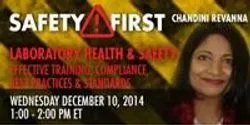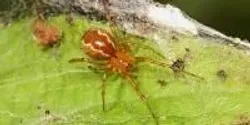
Lab Manager
Lab Manager provides guidance and resources to help laboratory leaders run their labs like a business. We are the only publication specifically focused on all aspects of running a lab.All by Lab Manager
Filter by
AllArticlesAudioEbooksEventsInfographicsNewsProductsSurveysDocumentsVideosVirtual EventsWebinars
Our two highlighted tradeshows this month include the Materials Research Society Fall Meeting and Exhibit (MRS) and the American Society for Cell Biology’s annual meeting (2014 ASCB/IFCB). The 2014 MRS Fall Meeting takes place November 30-December 5, 2014 in Boston, Massachusetts, featuring over 6,000 presentations. Not long after, the 2014 ASCB/IFCB Meeting–a premier biomedical research conference–runs December 6-10 in Philadelphia, Pennsylvania. Its Keynote Talks will span the origin of life to the cosmos. Remember that the companies highlighted here in Tech News will be exhibiting, but these specific products may not be at the shows.

Developing and implementing effective occupational health and safety compliance is accomplished through needs assessments, hazard analysis, monitoring, training, and through analysis of accident and incident history. Join our interactive discussion as our health and safety expert explains some of the details of developing an effective and compliant health & safety training program.
Available on Demand
In this webinar you will learn that SPME is a fast, solvent-less alternative to conventional sample extraction techniques. It’s ideal for the challenging sample matrices commonly encountered in many food laboratories.
Available on Demand
The Wallops Incident Response Team recently completed an initial assessment of Wallops Island, Virginia, following the catastrophic failure of Orbital Science Corp.’s Antares rocket shortly after liftoff at 6:22 p.m. EDT Tuesday, Oct. 28, from Pad 0A of the Mid-Atlantic Regional Spaceport at NASA’s Wallops Flight Facility in Virginia.

In sequencing laboratories, lab managers and scientists have to face many scientific challenges. Having to worry about the quality of the water they use shouldn’t be one of them. In this webinar Dr. Sean Kennedy, of the MetaGenoPolis NGS platform, MetaQuant, will share his experience and help you make the right decisions concerning water for your laboratory.
Available on Demand
This month, we highlight companies that will be exhibiting at two upcoming scientific trade shows–the American Association of Pharmaceutical Scientists’ Annual Meeting and Exposition (AAPS 2014) and the Society for Neuroscience’s Annual Meeting (Neuroscience 2014). AAPS 2014 takes place at the San Diego Convention Center from November 2-6 and offers pharmaceutical scientists the opportunity to network with others in their field and check out the latest pharma equipment. Neuroscience 2014 will run November 15-19 in Washington, DC, allowing neuroscientists to present emerging science, learn from experts, forge collaborations with peers, explore new tools and technologies, and advance careers.
















